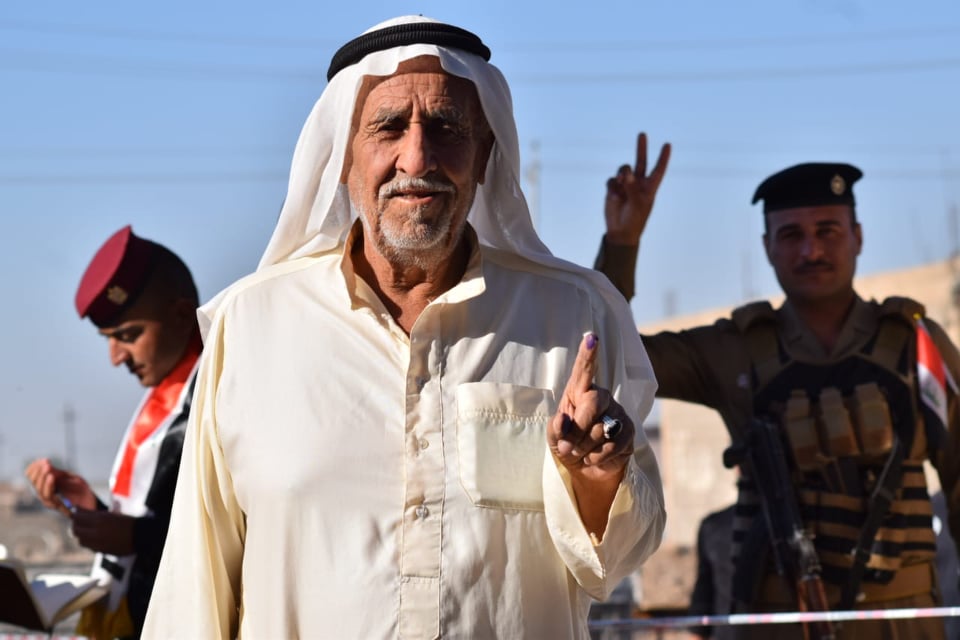The Federal Supreme Court of Iraq ruled one of the articles in the Parliamentary Elections Law was unconstitutional and decided to make changes in it, which would benefit the losing candidates who obtained the highest votes in their constituencies.
Pursuant to a decision issued by the Federal Court on November 14th 2021, some of the terms and phrases mentioned in article 46 of Law No. 9 of 2020 concerning parliamentary elections were considered unconstitutional.
Article 46 of the Elections Law states that “The winning candidate in the parliamentary elections is obligated to take the constitutional oath within a maximum period of one month from the date of the first session; otherwise the candidate who gets the most votes from the losing candidates from his list in his electoral district will be the alternative.”
In the same article, it states that "in the event that the oath is not taken by the individual candidate, the substitute for him shall be the highest loser in his electoral district."
According to the court’s decision, this article will be changed to “The winning candidate in the parliamentary elections is obligated to take the constitutional oath within a maximum period of one month from the date of the first session."
It was also decided to delete the term individual or independent candidate from that article.
These changes will allow the losing candidates with the highest votes in their constituencies to reach the parliament in the event that one of the winning candidates withdrew after taking the oath or if they did not take the constitutional oath from the beginning. Prior to these changes, a candidate who was not sworn in was replaced by another candidate from his list.
The process of recounting votes in some ballot stations in Kirkuk has come to end without any changes as it has matched the electronic tally, electoral body said.
The Independent High Electoral Commission IHEC end of October declared it has completed manual recount of votes for some ballot stations in six provinces including the northern oil-rich city of Kirkuk.
The results have undermined expectations for changes in the results and positions of the key blocs competing to lead the new cabinet, a matter rejected by pro Iran blocs whom lost two thirds of their seats.
The early parliamentary election was the fifth since the 2003 US-led invasion that toppled Saddam Hussein’s regime which was warmly welcomed and hailed by the United Nations, Security Council, US and Europe.
In this case, if Rakan Saeed al-Jubouri, current acting governor and the winning candidate for the Arab coalition in the third Arab-populated electoral district of Kirkuk, does not take the constitutional oath, his replacement will be the losing candidate with the highest votes in that constituency, Wasfi al-Asi from the United Arab Front UAF, while before the amendment, his seat would have gone to his brother, Sahmi Saeed Al-Jubouri, who made only 87 vote for the same list and electoral district.
In the same constituency, in the event that the winning candidate, Muhammad Tamim, does not take the constitutional oath, his replacement will be Wasfi Al-Asi, but Mona Al-Jubouri will be replaced by the losing candidate, Sahira Abdullah, from the Taqaddum Alliance led by Iraqi parliament speaker Mohammed al-Halbousiich which got 38 seats of the Iraqi parliament as the leading Sunni Arab bloc.
As for the second mixed electoral district, after changes in the electoral law, the losing candidate with the highest votes from the Al-Fateh Alliance, Gharib Askar, will be the most likely to replace Arshad Al-Salihi from the Turkmen Front, Kaylan Qadir from the Kurdistan Alliance, and Najwa Kakai from the Democratic Party Kurdistan and Sawsan Abdul Wahed from the Turkmen Front, in the event that any of them decides to withdraw or not take the constitutional oath.
Located 238 kilometers north of Baghdad, the oil-rich province of Kirkuk is an ethnically mixed province for 1.6 million Kurds, Arabs, and Turkmen, Muslims, Christians and Kaka'is. It has long been at the center of disputes between Baghdad and the Erbil.
Only 440,000 Kirkukis, about 44%, out of more than one million eligible voters cast ballots for 12 seats in the Iraqi parliament, three of it for women plus a seat for the Christian community.
Out of 130 competitors, only 33 of them were women. Kirkuk has been divided into the three electoral districts and 315 ballot centers, about 2,300 stations.
Khadija Ali Turkmani has a chance in that same constituency to reach parliament if the other two candidates withdraw or do not take the oath.
In the first Kurd-predominant constituency, if any of Shakhwan Abdullah (Kurdistan Democratic Party KDP), Omid Muhammad (New Generation Movement), Sabah Habib (Kurdistan Alliance) and Muhaimin Ali Al-Hamdani (independent candidate) withdraw, their replacement will be Muayyad Ghazi, the losing candidate with the highest votes in the constituency.
As for the winning independent candidate in the first constituency, Dylan Ghafour, her replacement will be the losing candidate with the highest votes in the same constituency, Alla Talabani, a candidate of PUK which was lately ousted from PUK.





